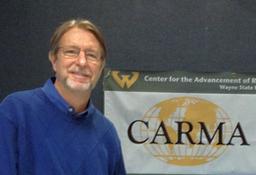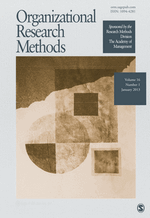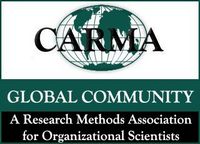CARMA Webcast Lecture Available: Statistical and Methodological Myths and Urban Legends

Dr. Robert Vandenberg
Professor of Management,
University of Georgia
Editor’s note: Read Dr. Larry Williams’ recent contribution to Management INK here.
Organizational scientists face many decision points related to research design and analysis as they conduct their research. While some of their choices and practices in this context are based on sound scientific evidence, in many cases they are based on “methodological urban legends” in the form of reasoning or rationalization that may be questionable. These myths and urban legends were the topic of a lecture given recently by Dr. Robert Vandenberg, Organizational Research Methods (ORM) Past Editor and long time CARMA contributor, as part of the CARMA Consortium Webcast Program. This lecture was presented at Wayne State University, home of the Center for the Advancement of Research Methods and Analysis (CARMA). It was viewed via a webcast and its recording continues to be viewed by faculty and graduate students at many of the 120+ universities world-wide that are members of this program, and its companion program the International Video Library Program.
 Dr. Vandenberg’s lecture for CARMA was a continuation of his work on this topic, done in collaboration with Dr. Charles Lance, which began nearly 10 years ago at an Academy of Management symposium and includes two edited books and two Feature Topics in ORM. For his CARMA Webcast Lecture, Dr. Vandenberg focused in part on myths and legends related to common method variance, cut-off criteria for goodness of fit measures and reliability, mediation, moderation, exploratory factor analysis, control variables, formative measures, and meta-analysis. In covering these topics, he addressed the “kernel of truth” underlying the myths and legends, as well as reasons and evidence they should be questioned and challenged. Dr. Vandenberg closed his one-hour lecture by discussing the need for a revolution in research practices and increased education to improve the quality of organizational research, and the roles that authors, reviewers, and editors play in supporting such change.
Dr. Vandenberg’s lecture for CARMA was a continuation of his work on this topic, done in collaboration with Dr. Charles Lance, which began nearly 10 years ago at an Academy of Management symposium and includes two edited books and two Feature Topics in ORM. For his CARMA Webcast Lecture, Dr. Vandenberg focused in part on myths and legends related to common method variance, cut-off criteria for goodness of fit measures and reliability, mediation, moderation, exploratory factor analysis, control variables, formative measures, and meta-analysis. In covering these topics, he addressed the “kernel of truth” underlying the myths and legends, as well as reasons and evidence they should be questioned and challenged. Dr. Vandenberg closed his one-hour lecture by discussing the need for a revolution in research practices and increased education to improve the quality of organizational research, and the roles that authors, reviewers, and editors play in supporting such change.
 For those who are not currently at a university belonging to CARMA’s programs, Dr. Vandenberg’s lecture is available for viewing free of charge until Friday, March 8th, and information on how to access it can be found on the CARMA Website. It is also available, along with recordings of 19 other webcast lectures, to members of the CARMA Global Community, an international professional association whose mission is to support the research methods educational needs of faculty and students from disciplines related to organizational studies. Those seeking more information and education on a variety of research methods topics may also be interested in one or more of CARMA’s Short Courses, with training led by top organizational scholars who provide hands-on experience with an emphasis on applications to management research. Additional guidance on statistical and methodological myths and urban legends can be found in this article by Dr. Vandenberg and this article by Dr. Lance in ORM, both of which are freely available until March 10th. Finally, more information related to all of the above can be found in the CARMA Messenger, the Newsletter of CARMA and its Global Community.
For those who are not currently at a university belonging to CARMA’s programs, Dr. Vandenberg’s lecture is available for viewing free of charge until Friday, March 8th, and information on how to access it can be found on the CARMA Website. It is also available, along with recordings of 19 other webcast lectures, to members of the CARMA Global Community, an international professional association whose mission is to support the research methods educational needs of faculty and students from disciplines related to organizational studies. Those seeking more information and education on a variety of research methods topics may also be interested in one or more of CARMA’s Short Courses, with training led by top organizational scholars who provide hands-on experience with an emphasis on applications to management research. Additional guidance on statistical and methodological myths and urban legends can be found in this article by Dr. Vandenberg and this article by Dr. Lance in ORM, both of which are freely available until March 10th. Finally, more information related to all of the above can be found in the CARMA Messenger, the Newsletter of CARMA and its Global Community.






















































































